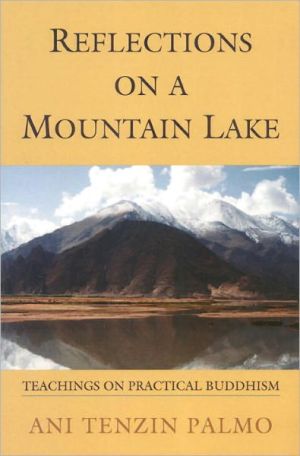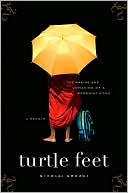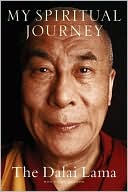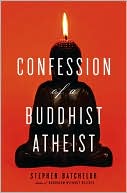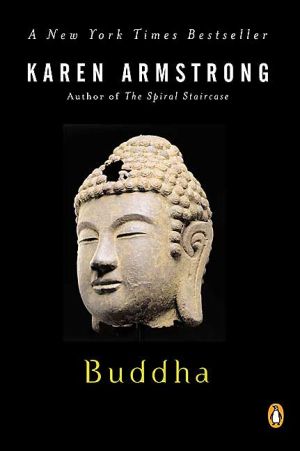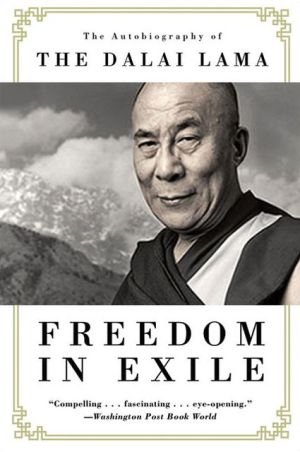Reflections on a Mountain Lake: Teachings on Practical Buddhism
This sparkling collection of Dharma teachings by Tenzin Palmo addresses issues of common concern to Buddhist practitioners from all traditions. Personable, witty, and insightful, Tenzin Palmo presents an inspiring and no-nonsense view of Buddhist practice.
Search in google:
Collection of Dharma teachings addressing issues of common concern to Buddhist practitioners from all traditions. Library Journal Excellent writing and a solid grasp of their subjects mark the efforts of these two authors. While both treat aspects of Buddhist thought, Boorstein's perspective derives from the Mahayana school, while Palmo's tradition is Tibetan. Boorstein (That's Funny, You Don't Look Buddhist) focuses on the ten paramitas (perfections of the heart), which include generosity, morality, renunciation, wisdom, energy, patience, truthfulness, determination, lovingkindness, and equanimity, and she devotes a chapter to each. (Of course, concepts like wisdom and equanimity are also a part of Tibetan Buddhism, but they operate differently in that tradition.) In each chapter, Boorstein follows the same format, first offering an explanation of what the particular paramita means within Buddhism, then instructing us on how to use the concept effectively in meditation, and finally illustrating the paramita with stories that grow out of her own experience and usefully show how that quality can be applied in life. By contrast, Palmo, a Buddhist nun, begins with a brief account of her life and training in Tibetan Buddhism. She then considers many of the major concepts of this school, including the six realms (e.g., hell, which she describes as a mind filled with anger; shamatha, or calm abiding; and vajrayana, or meditation that makes use of visualization). In addition, Palmo provides some wonderfully informative and useful chapters such as "Women and the Path" and "Difficult Points for Westerners." The latter includes an insightful discussion of karma and rebirth. Boorstein treats a more limited subject matter, while Palmo offers both greater breadth and depth. Both books are recommended, not only because they treat material from different schools of Buddhist thought but because both offer thorough explanations of their chosen subjects. Furthermore, the stories used to illustrate and clarify the various topics are effective and interesting, offering clear illustrations of how the teachings can be applied to life. David Bourquin, California State Univ., San Bernardino Copyright 2002 Cahners Business Information.
Preface71A Western Yogini92Motivation and Practice293Ethics and the Three Trainings414The Six Realms615Women and the Path696Shamatha, or Calm Abiding877Vipashyana, or Insight1058Awareness1219Difficult Points for Westerners15910Tonglen17911Nature of Mind18512The Role of the Spiritual Master20513Vajrayana22314Visualizing the Deity237Glossary of Technical Terms247
\ Library JournalExcellent writing and a solid grasp of their subjects mark the efforts of these two authors. While both treat aspects of Buddhist thought, Boorstein's perspective derives from the Mahayana school, while Palmo's tradition is Tibetan. Boorstein (That's Funny, You Don't Look Buddhist) focuses on the ten paramitas (perfections of the heart), which include generosity, morality, renunciation, wisdom, energy, patience, truthfulness, determination, lovingkindness, and equanimity, and she devotes a chapter to each. (Of course, concepts like wisdom and equanimity are also a part of Tibetan Buddhism, but they operate differently in that tradition.) In each chapter, Boorstein follows the same format, first offering an explanation of what the particular paramita means within Buddhism, then instructing us on how to use the concept effectively in meditation, and finally illustrating the paramita with stories that grow out of her own experience and usefully show how that quality can be applied in life. By contrast, Palmo, a Buddhist nun, begins with a brief account of her life and training in Tibetan Buddhism. She then considers many of the major concepts of this school, including the six realms (e.g., hell, which she describes as a mind filled with anger; shamatha, or calm abiding; and vajrayana, or meditation that makes use of visualization). In addition, Palmo provides some wonderfully informative and useful chapters such as "Women and the Path" and "Difficult Points for Westerners." The latter includes an insightful discussion of karma and rebirth. Boorstein treats a more limited subject matter, while Palmo offers both greater breadth and depth. Both books are recommended, not only because they treat material from different schools of Buddhist thought but because both offer thorough explanations of their chosen subjects. Furthermore, the stories used to illustrate and clarify the various topics are effective and interesting, offering clear illustrations of how the teachings can be applied to life. David Bourquin, California State Univ., San Bernardino Copyright 2002 Cahners Business Information.\ \
